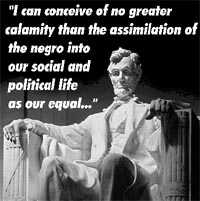
The "patriotic-American" argument for racial integration, which I had once accepted unquestionably, had collapsed, for if opposing racial integration made one un-American or unpatriotic, then unpatriotic is the man who wrote our Declaration of Independence, the president who ultimately freed the slaves and even the man who composed our national anthem. Our Founding Fathers were not only segregationists in the classic sense, they were White separatists who accurately predicted that the continued presence of Africans in America would lead to intractable social conflict. They believed the only equitable solution could be the repatriation of all Blacks from the United States, and they formed a society to accomplish that purpose. They even acquired land in Africa to become that new nation. In the end they were stymied in their quest, first by the economic power of slaveholders, who sought to preserve their fortunes, and later, at the close of the War for Southern Independence, by radical political forces who used the newly freed slaves as political fodder to maintain their control of the Congress.
Carleton Putnam's sources on our Founding Fathers checked out right down to their punctuation marks. My mind opened to the possibility that he might be correct in more than his historiography. It alarmed me to think of the implications of race having a cardinal role in the creation and maintenance of culture and civilization. If true then replacement of the White race through immigration and race-mixing could conceivably destroy Western Civilization itself.
The egalitarians and their allies in media and government have clearly embarked upon a policy that is rapidly changing the racial composition of the United States. Even if their policy is terribly misguided, once it is fully accomplished, there is no going back. It is as if a scientist working on a cure for headaches recklessly tests his hypothetical cure on himself. If the formula turns out toxic instead of healing, he will never devise another.
The logic is clear, if Putnam is right that it is the inherent distinctions between the races that produce sharp differences in culture and values, then changing America from an overwhelmingly White nation to a multiracial, multicultural society will produce inevitable racism and conflict.
On the other hand, logic told me that if the egalitarians were right, harmony and progress will continue with the racial change.
Putnam's arguments on racial integration were just as thoughtful as his historical revelations. I summarized his argument in my civics class term paper.
Putnam argues that race is a distinct reality in the world. That there have been thousands of studies of racial differences which have consistently revealed profound differences in IQ, and divergent behavioral patterns between Blacks and Whites. Numerous other studies have shown many identifiable distinctions between the physical brains and craniums of Blacks and Whites, and that these differences are the root causes of poor black educational performance and anti-social behavior. It is his belief that a civilization is the product of the particular racial group that created it and that demographic replacement of the founding race, through race-mixing, immigration, and differential birthrates, will diminish and ultimately destroy the vitality of the culture and civilization.
Putnam argues that the Supreme Court decision forcing integration of public education was a scientific and intellectual fraud perpetrated on the American public. He shows that the research of black social scientist, Dr. Kenneth Clark, was in clear contradiction to his subsequent testimony before the Supreme Court in Brown Vs. The Topeka Board of Education. The Brown decision turned on Clark's testimony that the self-esteem of Black children is seriously harmed by racial segregation.
Dr. Clark testified that when Black children were offered a choice between playing with White dolls or Black dolls, that they overwhelmingly chose the White ones—supposedly showing the psychic damage created by a segregated society. Dr. Clark concealed the fact that while it is true that in segregated schools Black children routinely prefer White dolls, his studies also showed that Black children in integrated schools were even more likely to choose White dolls.
In addition to harming the self-esteem of Black children, integration will actually harm the educational development of Black children. It creates a universalistic educational environment unresponsive to their specific needs and aptitudes. Putnam also argues that White children will suffer lower standards and the increased violence found in the Black community.
To paraphrase Lincoln, he says Blacks and Whites "will suffer on each side."
1
- Putnam, Carleton (1967). Race and Reason.